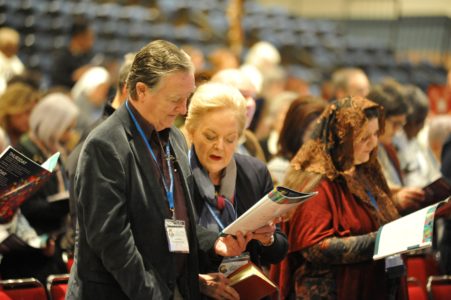By Fran Lavelle
KENNER, Louisiana – his year the Go! Conference (Gulf Coast Faith Formation Conference), offered a well-balanced and intentional diversity of subjects and speakers focused on the theme, “That All May Be One.” The Conference planners, including the diocesan directors of the region, work to reach as many ministries within parishes and schools as possible while remaining focused on religious formation. We are constantly looking at relevant topics that are spiritually nourishing as well as practical and hands on.
The first day of the Conference this year was quite different from years past. We offered three unique experiences: Liturgy and Music Workshop sponsored by WLP, a panel on the Interface Between Science and Religion sponsored by the University Notre Dame’s McGrath Institute and Leadership Thursday for catechist and formational ministry sponsored by Sadlier. Participants from the three cohorts began their day with Mass at 9:00 a.m. Each of the major workshops reached out to different constituents from STREAM teachers and administrators in Catholic Schools to parish catechists to musicians and liturgists. Hopefully the participants found, in their own niche, great insights and inspiration to bring home.
Karla Luke, Associate Superintendent, Office Catholic Education, a participant in the McGrath Institute’s session on science and religion, is a former teacher of both middle school science and religion. “This event was not only enlightening but also affirming. It gives ‘permission’ to Catholic school teachers to freely incorporate both Science and Religion into the other’s classes,” said Luke. She went on to say, “Furthermore, it clarified that acceptance of scientific theories and laws do not negate one’s faith; but, consequently may enhance it. The workshop not only confirmed my belief in God the Creator but confirmed the love God has for all creation.”

The idea that science and religion are mutually exclusive was addressed head on. Participants were given the examples of Kepler, Galileo, Boyle and Newton, all devoutly religious scientist who saw themselves as uncovering God’s majestic work through scientific reason. Dr. Chris Baglow, of the University of Notre Dame, shared with the group an analogy from Minicius Felix:
If upon entering some home you saw that everything there was well-tended, neat and decorative, you would believe that some master was in charge of it and that he was himself much superior to those good things. So too in the home of this world, when you see providence, order and law in the heavens and on earth, believe that there is a Lord and Author of the universe, more beautiful than the stars themselves and the various parts of the whole world. Minucius Felix (ca.200 AD)
On Saturday, the keynote speaker, Dr. JoAnn Paradise addressed the cultural roadblocks to creating unity over division. She talked about brain science and development of empathy from the womb. She stated that we are programmed in our DNA, on a cellular level, to learn behaviors through visual perception at a very young age — 0-3 months. Our addiction to digital media, in our culture, has worked to the detriment of developing appropriate human responses. God, she contends, planted in our brains a developmental need for an interconnectedness that technology cannot replicate or replace. One of the human responses not being developed is empathy. As we become less empathetic, we can quickly vilify others who look, think, pray and live differently because we see them as different. She showed a picture of three chicken eggs, one white, one light brown and one dark brown. In the following picture, the three eggs had been cracked and were in a frying pan next to one another. They all looked the same. She used the photos to illustrate that it is now more than ever the important work of the Church to proclaim the gospel, to end division and fully live out Catholic social teaching.
This is a rapidly changing cultural and technological world. Understanding current challenges and opportunities in ministry is essential if ministers, catechists and church members are to continue to share the faith. Creating awareness and strategies to deal with these changes is imperative. Mission accomplished for this year’s conference. We had great liturgies, enjoyed good conversations, met inspiring people, reunited with old friends and learned a lot. Save the date for next year’s Conference, “20/20: His Vision — Our Call” January 9-11, 2020.
“I thank thee, Lord God our Creator, that thou allowest me to see the beauty in thy work of creation.” Kepler.
(Fran Lavelle is the Director of Faith Formation for the Diocese of Jackson.)
